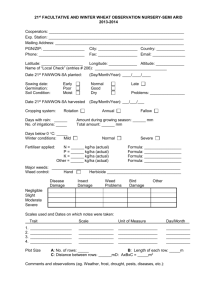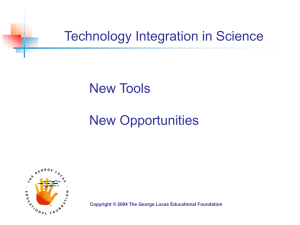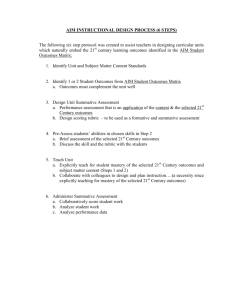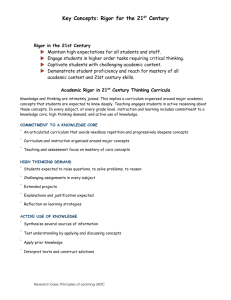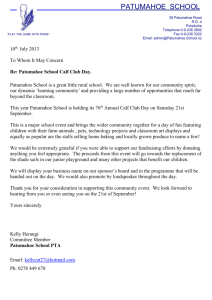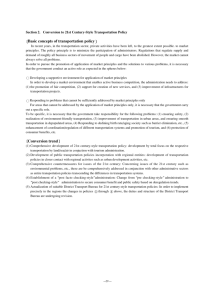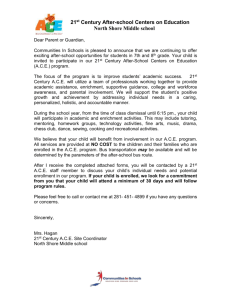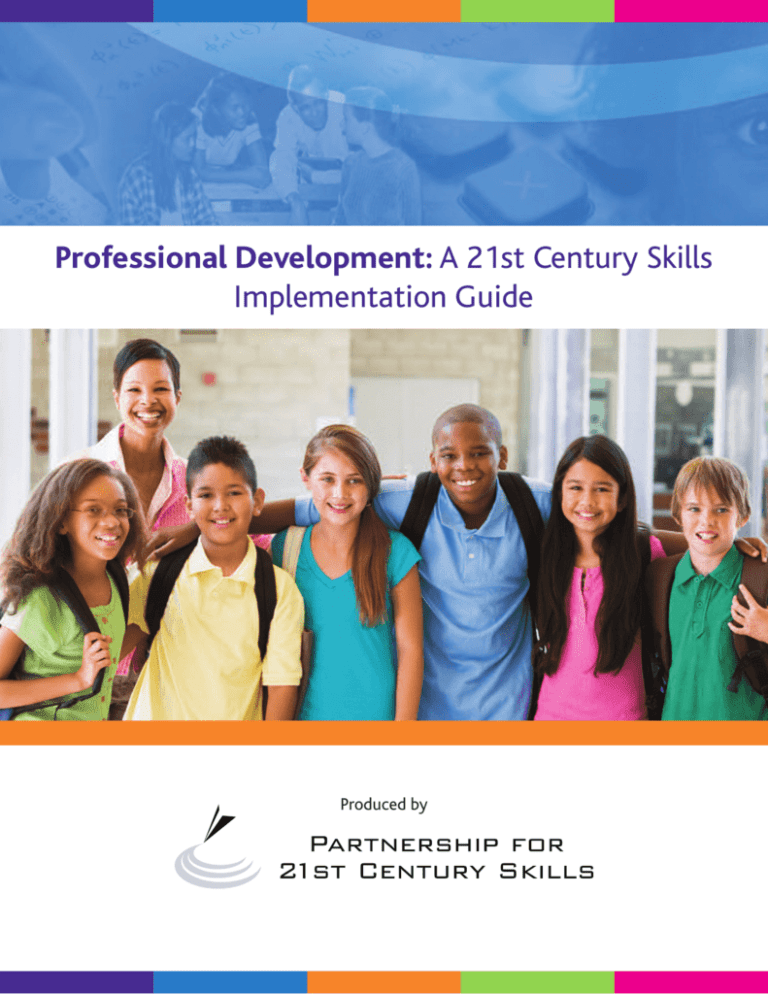
Professional Development: A 21st Century Skills
Implementation Guide
Produced by
To succeed in college, career and life in the
21st century, students must be supported in mastering both content and skills.
This Implementation Guide presents state leaders, policymakers and/or district
and school leaders with assessment tactics and examples to assist in statewide
21st century skills initiatives. The Partnership for 21st Century Skills has issued
five brief, user-friendly guides, one for each of the P21 support systems:
1. Standards
2. Assessment
3. Professional Development
4. Curriculum & Instruction
5. Learning Environments
It is worth noting that these support systems are not merely ends, but means to a greater goal—to help children
develop the cognitive, academic, emotional and physical competencies they need to succeed in 21st century life.
The Partnership recognizes that taking an aligned, comprehensive approach across all five support systems is a
significant challenge for all educators. The Implementation Guides have been developed to help support this
difficult work. While not every recommendation and example will apply to every state, we hope the resources
will help jumpstart efforts to produce more capable, successful 21st century students and citizens.
All 21st century skills initiatives must focus on:
1: Core Academic Subject Mastery
It is important to note that no 21st century skills implementation can be successful without developing
core academic subject knowledge and understanding among all students. Students who can think
critically and communicate effectively must build on a base of core academic subject knowledge. For
this reason, core academic subjects are a bedrock component of the P21 Framework for 21st Century
Learning. All 21st century skills can and should be taught in the context of core academic subjects.
2: 21st Century Skills Outcomes
In addition to core subject mastery, the Partnership asks every state, district and school the following
question: are schools helping students become...
• Critical thinkers?
• Problem solvers?
• Good communicators?
• Good collaborators?
• Information and technology literate?
• Flexible and adaptable?
• Innovative and creative?
• Globally competent?
• Financially literate?
To learn more about the Partnership’s state initiatives, the Framework or the Implementation Guides,
please visit www.21stcenturyskills.org.
Partnership for 21st Century Skills • 177 N. Church Avenue, Suite 305 • Tucson, AZ 85701 • (520) 623-2466
Rationale
Our nation faces serious questions in regards to our educational system. The purpose of this document is to
provide you with perspective on the key issues to consider—as a policy maker, as state leader, as a district or
school administrator—to ensure that you are planning for the future and building strategies that will solidify
the success of our students, not only in school and work, but in life.
Vision
Twenty-first century skills professional development supports teachers and administrators as they incorporate
21st century skills into their schools and classrooms. All professional development efforts should exist as part
of an aligned system of teaching and learning that includes 21st century skills standards, curriculum, instruction
and assessments. Successful professional development initiatives around 21st century skills, like most effective
PD efforts, include fundamental characteristics that are widely accepted, such as:
• Ensuring educators understand the importance of 21st century skills and how to best integrate them into
daily instruction.
• Enabling collaboration among all participants.
• Allowing teachers and principals to construct their own learning communities.
• Tapping the expertise within a school or school district through coaching, mentoring, and team teaching.
• Supporting educators in their role of facilitators of learning.
• Using 21st century technology tools.
Precise implementation recommendations follow.
21st Century Skills
Professional Development
supports teachers as they
integrate 21st century
skills, tools and teaching
strategies into their
classroom practice.
Partnership for 21st Century Skills • 177 N. Church Avenue, Suite 305 • Tucson, AZ 85701 • (520) 623-2466
Guiding Recommendations, Promising Directions
The following action steps can be taken to move states, districts and schools towards ensuring that our nation’s
students will be prepared for success in the 21st century.
Guiding Recommendations
Promising Directions
#1: Develop intensive teacher professional
development programs that focus intentionally
on 21st century skills instruction.
Consider developing PD sessions that focus on
enhancing authentic 21st century skills outcomes
in the teaching of core subjects and interdisciplinary
themes; for example, training that helps educators
integrate critical thinking and communication in
the context of mathematics lessons and instruction,
or creativity and ICT literacy in the context of
language arts lessons and instruction.
• North Carolina, New Literacies Collaborative at the Friday Institute is a
multidisciplinary group of researchers and practitioners who promote
research and online professional development for educators in new
literacies. http://www.fi.ncsu.edu/project/new-literacies-collaborative/
#2: Integrate 21st century skills into teacher
preparation and certification. Revise graduation
requirements for colleges of education to ensure
that prospective teachers are learning to model,
teach and assess 21st century skills.
• Iowa’s Authentic Intellectual Work (AIW) is a statewide initiative to
improve teaching and learning through ongoing professional development.
It highlights ways teachers can teach for deep understanding of subject
matter in ways that enhance problem-solving, critical thinking and other
21st century skills, through a balance of direct instruction and projectoriented teaching methods.
• The American Association of Colleges for Teacher Education
(AACTE) is partnering with P21 to generate a vision paper that will
include 1) a consensus definition of “21C-SOE: 21st Century Schools of
Education”, and 2) specific steps and recommendations on the federal,
state and local levels that will help guide the creation of 21st century
schools of education. http://www.aacte.org/
• The National Council for Accreditation of Teacher Education
(NCATE) is encouraging institutions to focus on initiatives related to
key national, state and district needs through a continuous selfimprovement process. http://www.ncate.org/
#3. Build capacity. Work with administrators and
teacher leaders to create an environment of
differentiated professional learning, risk taking,
and collaborative relationships.
Teacher Leader Capacity Building Model: Southfield Public Schools, MI
and Cypress Fairbanks ISD in Houston, TX are implementing capacity
building professional development using the teacher leader model at
selected schools in their districts. Teacher leaders and school-based coaches
are working with ASCD Faculty members to develop expertise in specific
instructional practices by participating in job-embedded professional
development experiences. Teacher leaders are leading the professional
learning of their colleagues and have their classrooms serve as
demonstration classrooms. District leaders have played an integral role in
assuring that there is effective professional development planning in place
before and during the implementation, including gathering evidence of
changes in teacher practice. http://www.ascd.org
#4: Develop district leadership teams to infuse
21st century skills throughout the school
district. Work with district superintendent to
develop district-level institutes for school
leadership teams around 21st century skills. Teams
should be trained and empowered to develop
district-level 21st century skills strategies. Such
institutes should also be places where teachers
can be trained as leaders able to pass on their
expertise to other teachers within their district.
Catalina Foothills School District in Tucson, Arizona has an Assistant
Superintendent for 21st Century Learning who works with a leadership
team to implement their program across the district.
http://www.cfsd16.org/public/_century/centMain.aspx
Partnership for 21st Century Skills • 177 N. Church Avenue, Suite 305 • Tucson, AZ 85701 • (520) 623-2466
Guiding Recommendations
Promising Directions
#5: Invest in ICT (information communications
technologies) excellence. Develop a PD program
focused on ensuring school and district technology
directors are fully trained in the area of ICT
literacy.
The Friday Institute of North Carolina State University is made up of
close to 60 corporate and government organizations and business
incubators working in partnership with faculty and students in a highly
innovative environment to “to advance education through innovation in
teaching, learning, and leadership.” http://www.fi.ncsu.edu/
#6: Develop professional learning
communities around specific 21st century
skills. Invest in creating professional online
learning communities to support teachers,
administrators and state department of education
employees in the creation of online support
groups for 21st century skills.
• Iowa's Authentic Intellectual Work Teacher Development Academy
is a statewide initiative to improve teaching and learning through
ongoing professional development. It highlights ways teachers can
teach for deep understanding of subject matter in ways that enhance
problem-solving, critical thinking and other 21st century skills, through
a balance of direct instruction and project-oriented teaching methods.
• Intel Teach uses a "Train the trainer" model to provide both face-toface and online instruction to help teachers around the world integrate
technology into their classrooms. Teachers create lesson plans that can
be immediately implemented and that meet local and national
education goals and standards. The program also offers an interactive
forum focused on leadership in promoting, supporting, and
implementing effective technology integration in schools.
http://www.intel.com/education/teach/index.htm
• In JeffCo Public Schools in Colorado, community engagement
technology is being used to bridge both the time and space gap for
district-wide professional learning communities. Using Blackboard
Learn™, teachers have fast access to content and peer groups most
relevant to their role. (http://www.blackboard.com/k12)
#7: Train administrators around how to lead
21st century skills initiatives.
• North Carolina’s Middle School Literacy Coaches are specially
selected teachers charged with coaching other teachers in the delivery
of 21st century instruction and embedding best practices into the
school culture.
• The West Virginia Institute for 21st Century Leadership prepares
West Virginia’s principals to develop and lead 21st century schools by
providing in-depth professional development and support for school
leaders, and expands the leadership knowledge/skills of West Virginia
principals to the application level of 21st century leadership.
#8: Offer professional development to state
departments of education staff.
• West Virginia held a nine-day Professional Development Series
whereby each office at the Department of Education explored the
applicability of 21st century skills to their own work.
#9: Engage colleges of education for 21st
century skills leadership. Develop PD for the
leadership of state colleges of education that
addresses 21st century skills. Involve deans and
faculty from colleges of education in district- and
state-level teacher professional development.
• The American Association of Colleges for Teacher Education
(AACTE) is partnering with P21 to generate a vision paper that will
include 1) a consensus definition of “21C-SOE: 21st Century Schools of
Education”, and 2) specific steps and recommendations on the federal,
state and local levels that will help guide the creation of 21st century
schools of education. http://www.aacte.org/
Partnership for 21st Century Skills • 177 N. Church Avenue, Suite 305 • Tucson, AZ 85701 • (520) 623-2466
Guiding Recommendations
Promising Directions
#10: Integrate 21st century skills into teaching
standards. Advocate for the integration of 21st
century skills into teaching standards to ensure
that teachers are able to teach and assess critical
thinking and problem solving skills.
• North Carolina and West Virginia State Boards of Education have
adopted revised professional teaching standards that are aligned to 21st
century teaching and learning. Teacher evaluation tools and teacher
professional development programs focusing on 21st century skills are
based on these teacher standards.
• National Board for Professional Teaching Standards (NBPTS) is an
independent, nonprofit, nonpartisan and nongovernmental organization
formed in 1987 to advance the quality of teaching and learning by
developing professional standards for accomplished teaching, creating a
voluntary system to certify teachers who meet those standards and
integrating certified teachers into educational reform efforts.
http://www.nbpts.org/
#11: Leverage the reach of the Web to
distribute resources. Build a resource-rich PD
website for teachers across each state. These sites
should assist colleagues in planning and delivering
effective 21st century instruction in the
classroom.
• Teach 21 is a comprehensive Web resource designed by teachers
working collaboratively with the West Virginia Department of
Education. http://wvde.state.wv.us/teach21
• Thinkfinity is the cornerstone of Verizon Foundation's literacy,
education and technology initiatives. The resources available through
Thinkfinity's content partners reflect 21st century teaching and skills
and make use of digital sources. http://www.thinkfinity.org/
Partnership for 21st Century Skills • 177 N. Church Avenue, Suite 305 • Tucson, AZ 85701 • (520) 623-2466
Resources
In addition to the references above, the Partnership for 21st Century Skills has compiled the following list of
resources to provide you with background knowledge, models and best practices in the various areas of
professional development.
Institutions and Thought Leaders
AACTE, http://www.aacte.org
ASCD, http://www.ascd.org
The Friday Institute, North Carolina State University, http://www.fi.ncsu.edu/
The National Board for Professional Teaching Standards, http://www.nbpts.org
Verizon Thinkfinity, http://www.thinkfinity.org/
A complete updated list of available references, including reports, state initiatives, white papers and more are
available at www.21stcenturyskills.org.
Free White Paper on 21st Century Professional Development
Download “21st Century Professional Development” from the Partnership for 21st Century Skills website at
http://www.21stcenturyskills.org/documents/21st_century_skills_professional_development.pdf.
About the Partnership for 21st Century Skills
The Partnership for 21st Century Skills has emerged as the leading advocacy organization focused on infusing
21st century skills into education. The organization brings together the business community, education leaders
and policymakers to define a powerful vision for 21st century education to ensure every child's success as
citizens and workers in the 21st century. The Partnership encourages schools, districts and states to advocate for
the infusion of 21st century skills into education and provides tools and resources to help facilitate and drive
change.
To learn more about 21st century learning and state actions to date, visit www.21stcenturyskills.org.
Copyright © 2009. The Partnership for 21st Century Skills. All rights reserved.
Partnership for 21st Century Skills • 177 N. Church Avenue, Suite 305 • Tucson, AZ 85701 • (520) 623-2466

